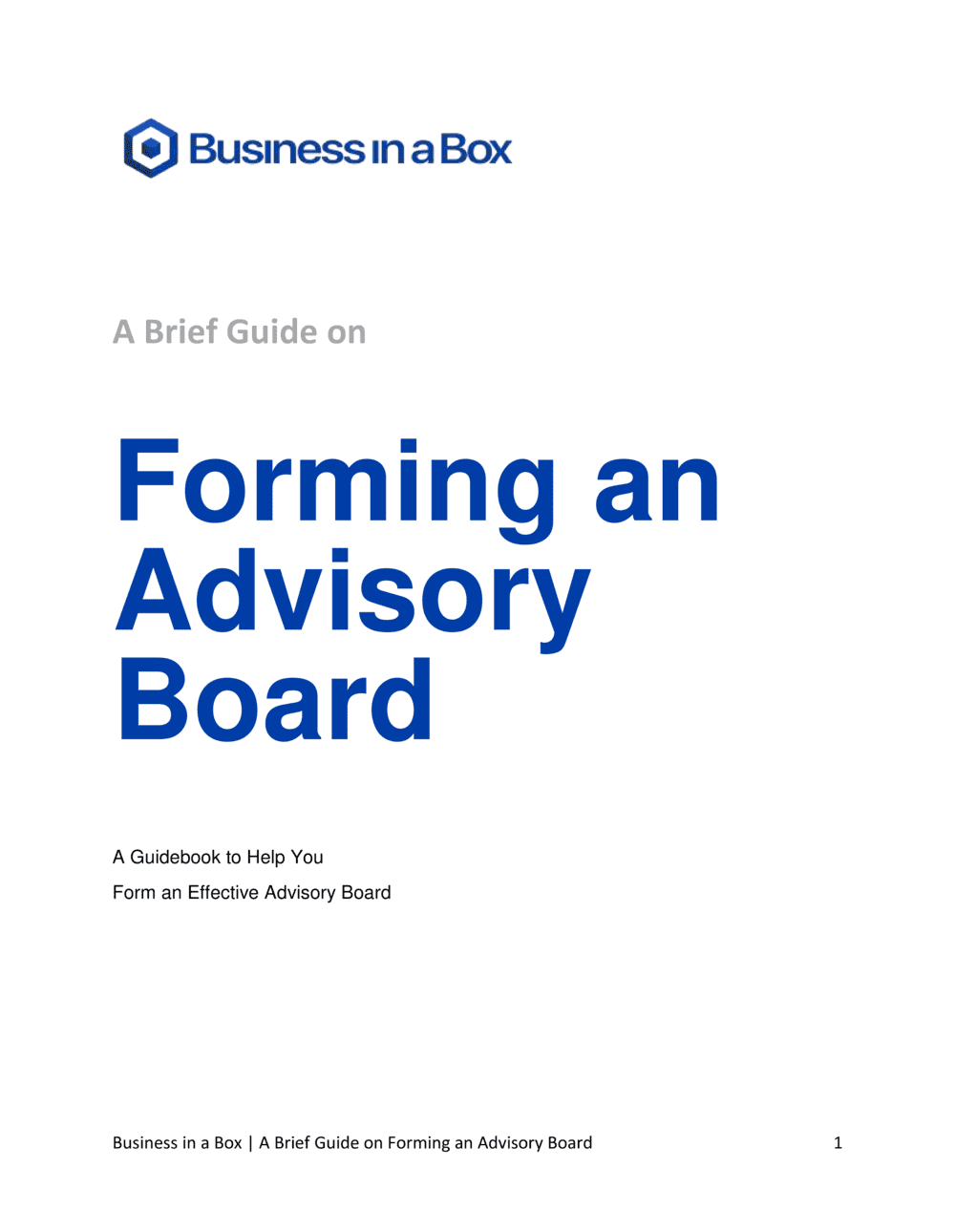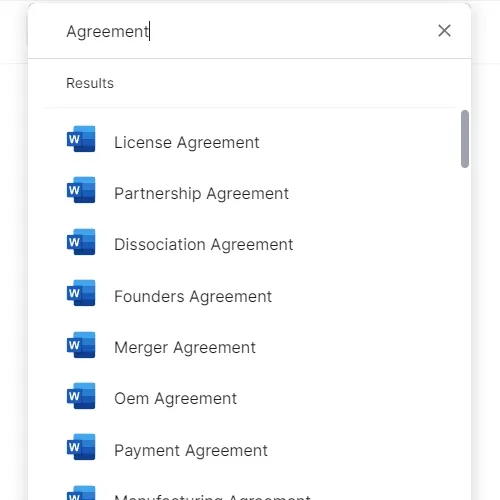Guide To Forming An Advisory Board

Sample of Document Content
This guide to forming an advisory board template has 12 pages and is a MS Word file type listed under our business plan kit documents.
Guide to forming an advisory board
A Brief Guide on Forming an Advisory Board A Guidebook to Help You Form an Effective Advisory Board Table of Contents An Introduction to Advisory Boards 3 What is an Advisory Board? 3 Responsibilities of an Advisory Board 4 Ideal Qualities of Advisory Board Members 5 Experience 5 Networking Skills 5 Adaptability 6 Mentorship Skills 6 Advisory Board Members: Skills in Demand 7 Steps to Form an Advisory Board 8 Step 1: Determine Your Business Needs 8 Step 2: Create Distinct Job Profiles 8 Step 3: Screen a High Number of Candidates 9 Step 4: Finalize Selected Candidates with Proper Documentation 9 Step 5: Set Meeting Frequencies and KPIs 10 Advisory Board Compensations 11 Final Thoughts 12 An Introduction to Advisory Boards Sustainability is a vital facet of running a successful business. Entrepreneurs need validation and clarity to formulate concrete business strategies. To escalate business growth, an independent group of advisors proves highly lucrative. There are over 1.3 million active advisors that provide practical advice to various corporate managements. The most significant benefit of setting up an independent board of advisors is an impartial assessment of current and potential business strategies. Advisory boards cover various facets of enterprise functioning. Thus, selecting and forming your custom board of advisors is gradually becoming mandatory. This guide aims to provide simple yet effective steps for forming an advisory board. Irrespective of the business scale, you should never overlook the crucial role of advisory boards in your corporate growth. Before moving ahead, it's vital to understand the basics of this management concept. What is an Advisory Board? In simple terms, an advisory board is a group of experts that provide invaluable suggestions to a company's managerial team. A company's managerial team can consist of owners, CEOs, or top-level management. Importantly, this team has the power to make crucial business decisions. Ideally, the advisory board guides the top-level management in six predominant areas of business functionality: Business vision Current challenges Business model strategy Risk management Profitability Quality improvement suggestions Advisory boards do not possess the influence to vote in a company's business matters. In fact, "growth" is the preeminent factor for appointing advisory boards. Responsibilities of an Advisory Board The responsibilities of advisors can vary from small-scale to large-scale companies. Still, on a generic basis, businesses expect an advisory board to perform well-defined duties: Developing the business Introducing investors Suggesting new business ideas Monitoring business performance Acting as an unbiased support mechanism Expert advisors with in-depth knowledge of the target sector are ideal to become a part of the advisory board. Ideal Qualities of Advisory Board Members It's vital to choose the right individuals to form an effective advisory team. So, look for qualities that make professionals suitable to become members of your advisory board. Experience It will be beneficial if you choose advisors that have experience in your business domain. Such advisors can help you avoid mistakes that are common in your field of business. For example, an automotive startup overlooks the requirement of data management software. Consequently, this company ends up delaying orders, which leads to a rise in customer complaints. In such a case, experienced advisory board members can quickly assess the situation. They may suggest implementing suitable software to solve the issue. Networking Skills Advisors that can connect businesses with relevant contacts become highly profitable for the company. An advisory board can have individuals with diversified skills. Hence, a member with excellent networking skills can help with business expansion. Adaptability Advisory board members will come in contact with your employees and members at pivotal moments. Hence, this group should be able to adapt to your company's culture. Communication and flexibility are the critical aspects of an ideal advisory board. Moreover, ensure your board of advisors understands your business' passion, purpose, and work environment. Mentorship Skills Startups need experienced and open-minded advisors in order to grow at a brisk pace. Hence, if you own a new startup, aim for advisors with good coaching and mentorship skills. An advisory board should be ready to share insights and teach certain business knowhow. Importantly, they should not be hesitant to ask questions of business owners or management. Advisory Board Members: Skills in Demand Business management looks for specific corporate attributes in an advisory board member. The Saine Marketing survey concluded the following competencies were required. Table 1: Frequent Competencies Required for Advisory Board Members Competency Demand Finance and Accounting 65% Marketing and Sales 51% HR 43% Industrial Expertise 38% Operational Competency 37% Steps to Form an Advisory Board On average, an advisory board consists of five people. Hence, forming your advisory board isn't a daunting task. Step 1: Determine Your Business Needs
Reviewed on

Sample of Document Content
This guide to forming an advisory board template has 12 pages and is a MS Word file type listed under our business plan kit documents.
Sample of our guide to forming an advisory board template:
A Brief Guide on Forming an Advisory Board A Guidebook to Help You Form an Effective Advisory Board Table of Contents An Introduction to Advisory Boards 3 What is an Advisory Board? 3 Responsibilities of an Advisory Board 4 Ideal Qualities of Advisory Board Members 5 Experience 5 Networking Skills 5 Adaptability 6 Mentorship Skills 6 Advisory Board Members: Skills in Demand 7 Steps to Form an Advisory Board 8 Step 1: Determine Your Business Needs 8 Step 2: Create Distinct Job Profiles 8 Step 3: Screen a High Number of Candidates 9 Step 4: Finalize Selected Candidates with Proper Documentation 9 Step 5: Set Meeting Frequencies and KPIs 10 Advisory Board Compensations 11 Final Thoughts 12 An Introduction to Advisory Boards Sustainability is a vital facet of running a successful business. Entrepreneurs need validation and clarity to formulate concrete business strategies. To escalate business growth, an independent group of advisors proves highly lucrative. There are over 1.3 million active advisors that provide practical advice to various corporate managements. The most significant benefit of setting up an independent board of advisors is an impartial assessment of current and potential business strategies. Advisory boards cover various facets of enterprise functioning. Thus, selecting and forming your custom board of advisors is gradually becoming mandatory. This guide aims to provide simple yet effective steps for forming an advisory board. Irrespective of the business scale, you should never overlook the crucial role of advisory boards in your corporate growth. Before moving ahead, it's vital to understand the basics of this management concept. What is an Advisory Board? In simple terms, an advisory board is a group of experts that provide invaluable suggestions to a company's managerial team. A company's managerial team can consist of owners, CEOs, or top-level management. Importantly, this team has the power to make crucial business decisions. Ideally, the advisory board guides the top-level management in six predominant areas of business functionality: Business vision Current challenges Business model strategy Risk management Profitability Quality improvement suggestions Advisory boards do not possess the influence to vote in a company's business matters. In fact, "growth" is the preeminent factor for appointing advisory boards. Responsibilities of an Advisory Board The responsibilities of advisors can vary from small-scale to large-scale companies. Still, on a generic basis, businesses expect an advisory board to perform well-defined duties: Developing the business Introducing investors Suggesting new business ideas Monitoring business performance Acting as an unbiased support mechanism Expert advisors with in-depth knowledge of the target sector are ideal to become a part of the advisory board. Ideal Qualities of Advisory Board Members It's vital to choose the right individuals to form an effective advisory team. So, look for qualities that make professionals suitable to become members of your advisory board. Experience It will be beneficial if you choose advisors that have experience in your business domain. Such advisors can help you avoid mistakes that are common in your field of business. For example, an automotive startup overlooks the requirement of data management software. Consequently, this company ends up delaying orders, which leads to a rise in customer complaints. In such a case, experienced advisory board members can quickly assess the situation. They may suggest implementing suitable software to solve the issue. Networking Skills Advisors that can connect businesses with relevant contacts become highly profitable for the company. An advisory board can have individuals with diversified skills. Hence, a member with excellent networking skills can help with business expansion. Adaptability Advisory board members will come in contact with your employees and members at pivotal moments. Hence, this group should be able to adapt to your company's culture. Communication and flexibility are the critical aspects of an ideal advisory board. Moreover, ensure your board of advisors understands your business' passion, purpose, and work environment. Mentorship Skills Startups need experienced and open-minded advisors in order to grow at a brisk pace. Hence, if you own a new startup, aim for advisors with good coaching and mentorship skills. An advisory board should be ready to share insights and teach certain business knowhow. Importantly, they should not be hesitant to ask questions of business owners or management. Advisory Board Members: Skills in Demand Business management looks for specific corporate attributes in an advisory board member. The Saine Marketing survey concluded the following competencies were required. Table 1: Frequent Competencies Required for Advisory Board Members Competency Demand Finance and Accounting 65% Marketing and Sales 51% HR 43% Industrial Expertise 38% Operational Competency 37% Steps to Form an Advisory Board On average, an advisory board consists of five people. Hence, forming your advisory board isn't a daunting task. Step 1: Determine Your Business Needs
Easily Create Any Business Document You Need in Minutes.

Download or open template
Access over 3,000+ business and legal templates for any business task, project or initiative.

Edit and fill in the blanks
Customize your ready-made business document template and save it in the cloud.

Save, Share, Export, or Sign
Share your files and folders with your team. Create a space of seamless collaboration.


